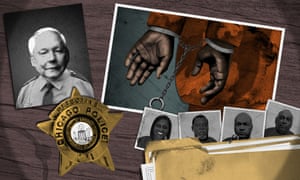A Chicago Police Officer Will Actually Go to Jail for Murdering Laquan McDonald.
| A little bit of justice. Photo: Antonio Perez/AFP/Getty Images |
NY INTELLIGENCER
 |
| While ‘assigned’ to the US military base at Guantánamo Bay, detective Richard Zuley (top left) led one of the most brutal interrogations ever conducted at the prison. ‘I’ve never seen anyone stoop to these levels,’ a former Marine Corps prosecutor said. But Benita Johnson, Andre Griggs, Lathierial Boyd and Lee Harris (above, left to right) describe Zuley using familiar techniques on them at Chicago police precincts. Illustration: Nate Kitch for the Guardian |
Chicago is a city where, less than three decades ago, white police officers made a regular practice of beating African-American suspects with phone books, suffocating them with typewriter covers, burning them on radiators, and shocking their genitals with electricity until they agreed to confess to serious crimes. For years, the officer who established this practice was a municipal hero; until his death last month, the city paid him a $4,000 monthly pension.
 |
| Jon Burge in 2010. He and detectives under his command were accused of extracting confessions from more than 100 people by using torture tactics.Charles Rex Arbogast/Associated Press. |
The United States is a country where police are almost never charged with— let alone, convicted of — murder when they shoot criminal suspects dead; even when those suspects are unarmed, or dutifully following orders, or 12 years old.
So, when Jason Van Dyke shot Laquan McDonald 16 times — first, as the 17-year-old was walking away, and then, as he was writhing on the ground — the Chicago police officer had good reason to think that no jury of his peers would ever call him a murderer. And for more than a year after the 2014 shooting, prosecutors brought no charges against him, while city officials did their best to keep the public from seeing the video of what he’d done. Finally, a court order brought the footage to light, and a protest movement into the streets. Popular outrage cost the police superintendent and county prosecutor their jobs.
Still, at the time of his death, McDonald was an African-American teenager with a knife, and Van Dyke was a white man with a badge. Even in the city’s new sociopolitical environment, there was little reason to assume that video evidence would be enough to prove that McDonald’s summary execution wasn’t “reasonable and necessary.”
But, on Friday, for the first time in nearly half a century, a Chicago jury convicted a police officer of murder in an on-duty shooting. Jurors did reject the prosecutors’ preferred charge of first-degree murder, opting instead for second-degree. But they also found Van Dyke guilty of 16 counts of aggravated battery, once for each bullet he put into McDonald’s body.
Now, Chicago is a slightly more just city than it was one day ago.